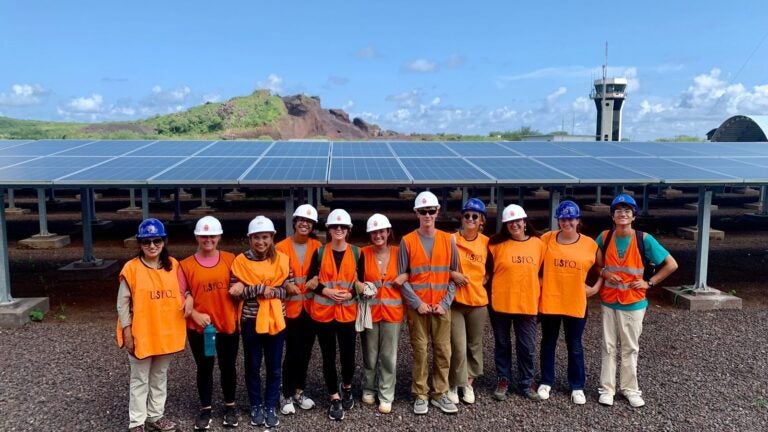Going Abroad to Find a Way Home
Picture this: you’re a USC environmental studies major with a lifelong fear of sharks and swimming in the ocean. You want to spend a semester abroad. Where do you go? The…Galápagos Islands?
If you’re Alisha Soni, the answer is a resounding “Yes!” But then again, she’s never been one to do something halfway.

Soni, who’s in her senior year as a dual environmental studies and NGOs and social change major, first became interested in sustainability as a high schooler and immediately dove headfirst into the field.
“I took an AP environmental studies class and just fell in love with it and decided to hit the ground running. The more I dove into it, the more I realized I was passionate about the environment,” she says.
After completing an internship in sustainable agriculture in her hometown of Knoxville, TN, Soni decided to look for a university with strong offerings in sustainability and the environment. Enter the USC Dornsife Environmental Studies Program (ENST), which is part of the Wrigley Institute for Environment and Sustainability.
“The environmental studies program was a huge factor for me in coming to USC,” Soni says. “I could tell that it was really robust and had a lot of resources for me. I even reached out to professors and could tell that the environmental community here was strong.”
Once she arrived at USC, Soni worked to make the most of her experience, landing internships in climate justice, sustainable economics, and environmental, social, and corporate governance (ESG) alongside her classroom studies. She also completed a Maymester in Argentina and a Julymester in Italy. Those experiences sparked her interest in spending a full semester abroad. As she began researching programs, one in particular caught her eye: 17 weeks in Ecuador with the Universidad San Francisco de Quito (USFQ).
The program was new to USC’s list of approved study-abroad programs, which meant that Soni could be sure of receiving USC credit for her courses and could apply her USC financial aid to the program costs. But the program’s curriculum was what really grabbed her attention. It was entirely focused on environmental studies, and it even had a track that meshed perfectly with her interests: People, Politics, & the Environment.
This social science component is precisely why Environmental Studies Program Director and Associate Professor (Teaching) of Environmental Studies Jill Sohm was excited to approve the USFQ opportunity for credit in ENST majors.
“Usually this type of program is based around natural science. [USFQ] provides a whole other way of doing fieldwork around the people aspect of things, which is a really important part of sustainability and environmental problems,” Sohm says. “Understanding challenges that are being faced in other parts of the world is really powerful.”
Soni’s experience bears out this idea. She spent 6 weeks in Quito, Ecuador’s capital, followed by a week in the Amazon and 10 weeks in the Galápagos islands. Her courses focused on topics such as sustainable ecotourism, extractive industries, and the impacts of both on Indigenous communities. The students conducted fieldwork both on land and in the water and learned from Indigenous educators about their tribes’ methods for living in harmony with the environment. By seeing environmental and sustainability issues at play in a new location, Soni says, she gained a new perspective on what our planet’s future could be.
“The more I learned about Indigenous communities in Ecuador, the more I learned how their relationship with the environment is centered in their way of living. We’re often asked today to reimagine what we want the future to look like. There is an opportunity to look at how Indigenous communities have done things and see that as a way forward,” she says.
The USFQ program was also a time of significant personal growth for Soni. Remember that fear of sharks and swimming in the ocean? Thanks to a strong support system within the program, she mustered the courage to conquer it. Over the course of her 10 weeks in the Galápagos, she slowly spent more and more time in the water. At first, even 20 minutes of wading in the ocean was too much. But with her cohort cheering her on, she worked her way up to swimming, then snorkeling, and finally to becoming scuba-certified. Her experience culminated in a diving trip where she swam with a group of hammerhead sharks–an event she calls “the best day of my life in 21 years.”
Above: Footage from Alisha Soni’s final scuba dive of her trip.
Soni also learned how to be more comfortable on her own. Given her previous study-abroad experiences and the fact that she attends college 2,000 miles away from her family, she didn’t expect to struggle with homesickness in Ecuador. But in the Galápagos, internet access and cell phone reception were spotty at best, so she couldn’t communicate regularly with her parents or friends. The remote location also meant that she couldn’t fill her down time with a multitude of activities. Instead, she spent more time relaxing, reading, and sitting with her own thoughts. “It was difficult for me, but in hindsight, I’m super grateful for that experience,” she says.
Soni is still deciding whether to accept a full-time job offer she’s received for post-graduation. In the meantime, thanks to her semester abroad, she’s looking forward to tackling her senior year with a renewed sense of purpose.
“I realized [in Ecuador] that I’ve gotten very caught up in the routine and stressors of everyday life. The program reminded me why I love environmental science so much, the impact that I want to have on the world, and the opportunities that are out there for me to pursue a career in this field,” Soni says. “It was a nice validation that I’m on the right track and a reminder to pursue the things that spark that excitement in me.”








